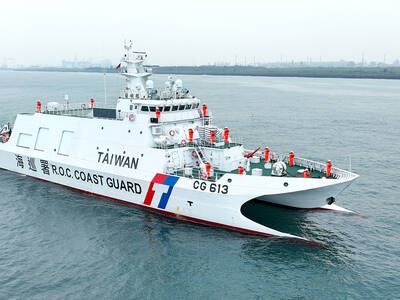A large number of factories lining a tributary of the Tamsui River (淡水河) have been discharging unprocessed wastewater, leading to excessive levels of cyanide and heavy metals in water, according to an Environmental Protection Administration (EPA) investigation conducted from March to last month.
A section of the Dahan River (大漢溪) near the Sinhai Bridge (新海橋) connecting New Taipei City’s Sinjhuang (新莊) and Banciao (板橋) districts — which is about 3km away from where the Dahan joins the Tamsui River — and a section near the Zhongxiao Bridge (忠孝橋) connecting Taipei and New Taipei City were the only two places along the Tamsui River system where severe pollution was found last year, Department of Water Quality Director Yeh Chun-hung (葉俊宏) said on Friday.
However, this year the EPA identified a “pollution hotspot” in the Taliaokeng River (塔寮坑溪) at Sinjhuang — a tributary of the Dahan that feeds into the Tamsui River.
An investigation by the EPA and the New Taipei City Government found that 45 out of the 70 factories along the Taliaokeng had illegally discharged effluent containing high levels of heavy metals and toxins.
Investigators detected cyanide levels that were 42 times higher than the legal limit in the river, as well as copper concentrations that were 90 times than the legal limit, which exposed fish and humans to great health risks, Yeh said.
Electroplating plants were the worst violators, he said.
Ninety-nine violations were found during the investigation, and the EPA issued fines totaling more than NT$20 million (US$615,347), he said, adding that water quality improved afterward.
“It is very difficult to crack down on illegal wastewater discharge because plants often use hidden pipes to drain wastewater,” Bureau of Environmental Inspection Northern Branch Director Chuang Hsun-cheng (莊訓城) said.
“An electroplating plant whose sewage was responsible for raising cyanide levels in water to 42 times more than the legal limit tried to dilute its sewage with tap water after plant operators spotted environmental agents approaching the plant. However, the agents found that the quality of sewage was too similar to tap water, and they uncovered hidden sewage pipes at the factory,” Chuang said.
“Factories might discharge unprocessed water during typhoons or torrential rains, so it is very difficult to discover violations. Environmental authorities rely heavily on whistle-blowers to identify plants that are engaged in illegal activities,” Chuang said.
A New Taipei City bylaw stipulates that people who inform on water pollution can be awarded up to 20 percent of fines levied against a violating firm, and the reward would be tripled if the informant is a current or former employee of the company, the EPA said.
“About 120 kilometers of river sections in the nation are severely polluted. The Taliaokeng River investigation could be used as a pilot program for further prevention at pollution ‘hotspots,’” Yeh said.

A total lunar eclipse coinciding with the Lantern Festival on March 3 would be Taiwan’s most notable celestial event this year, the Taipei Astronomical Museum said, urging skywatchers not to miss it. There would be four eclipses worldwide this year — two solar eclipses and two lunar eclipses — the museum’s Web site says. Taiwan would be able to observe one of the lunar eclipses in its entirety on March 3. The eclipse would be visible as the moon rises at 5:50pm, already partly shaded by the Earth’s shadow, the museum said. It would peak at about 7:30pm, when the moon would

The Coast Guard Administration (CGA) yesterday held a ceremony marking the delivery of its 11th Anping-class offshore patrol vessel Lanyu (蘭嶼艦), saying it would boost Taiwan’s ability to respond to Beijing’s “gray zone” tactics. Ocean Affairs Council Deputy Minister Chang Chung-Lung (張忠龍) presided over the CGA event in the Port of Kaoshiung. Representatives of the National Security Council also attended the event. Designed for long-range and protracted patrol operations at sea, the Lanyu is a 65.4m-long and 14.8m-wide ship with a top speed of 44 knots (81.5kph) and a cruising range of 2,000 nautical miles (3704km). The vessel is equipped with a

DEFENSE: The US should cancel the US visas or green cards of relatives of KMT and TPP lawmakers who have been blocking the budget, Grant Newsham said A retired US Marine Corps officer has suggested canceling the US green cards and visas of relatives of opposition Taiwanese lawmakers who have been stalling the review of a proposed NT$1.25 trillion (US$39.7 billion) special defense budget. The Executive Yuan has proposed the budget for major weapons purchases over eight years, from this year to 2033. However, opposition lawmakers have refused to review the proposal, demanding that President William Lai (賴清德) first appear before the Legislative Yuan to answer questions about the proposed budget. On Thursday last week, 37 bipartisan US lawmakers sent a letter to Legislative Speaker Han Kuo-yu (韓國瑜), the heads

Two siblings in their 70s were injured yesterday when they opened a parcel and it exploded, police in Yilan said, adding the brother and sister were both in stable condition. The two siblings, surnamed Hung (洪), had received the parcel two days earlier but did not open it until yesterday, the first day of the Lunar New Year holiday in Taiwan, police said. Chen Chin-cheng (陳金城), head of the Yilan County Government Police Bureau, said the package bore no postmark or names and was labeled only with the siblings’ address. Citing the findings of a